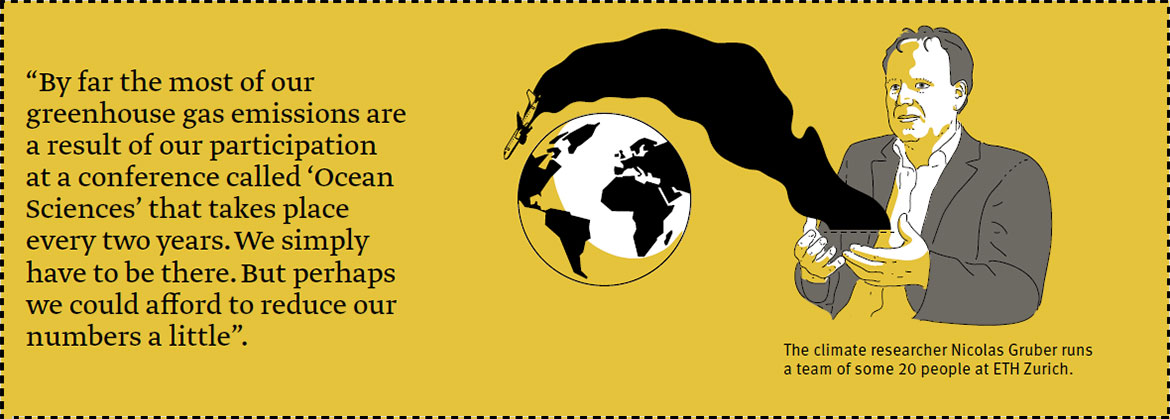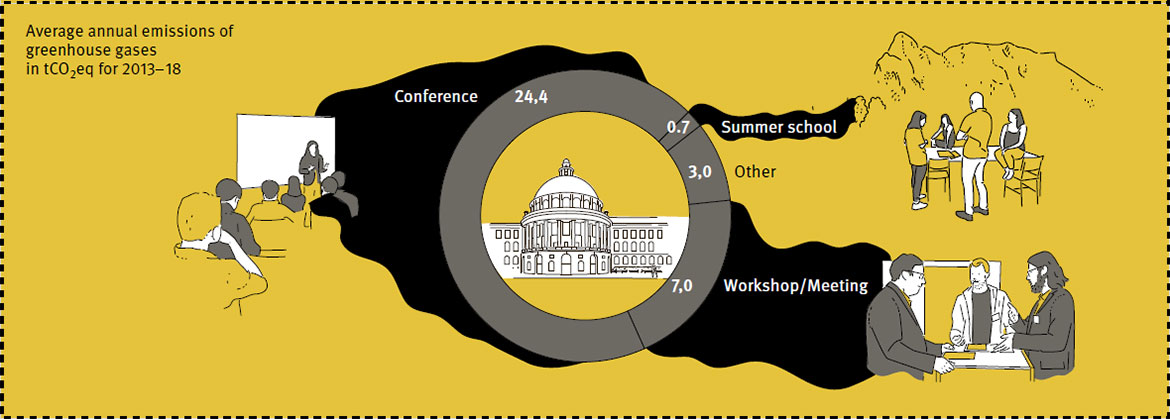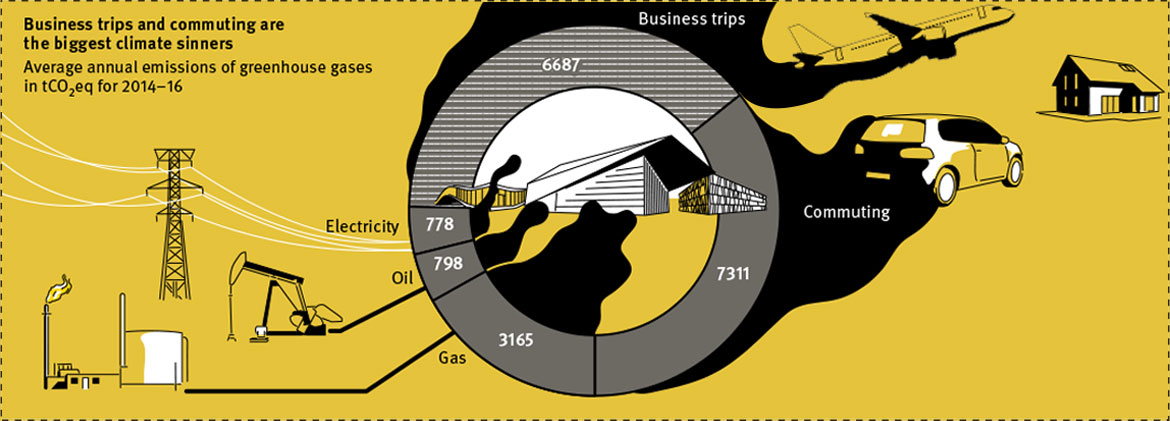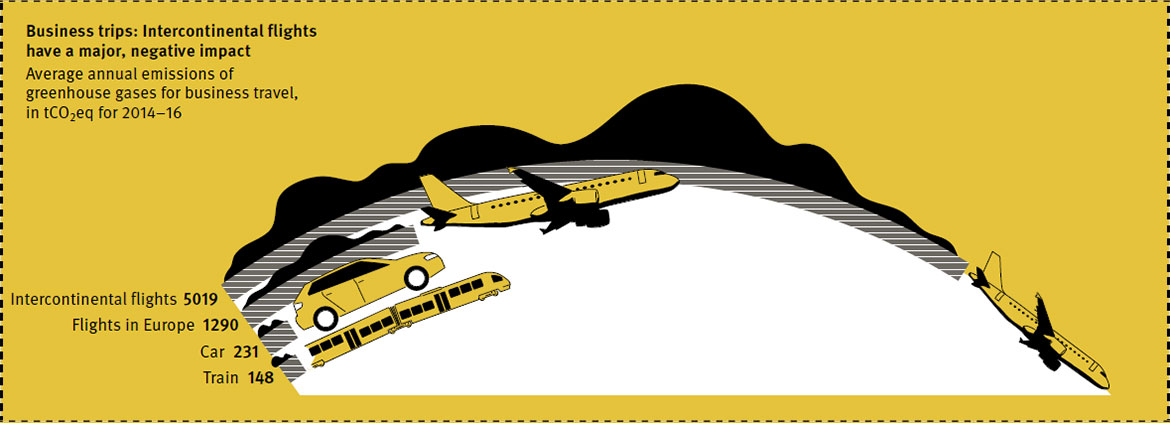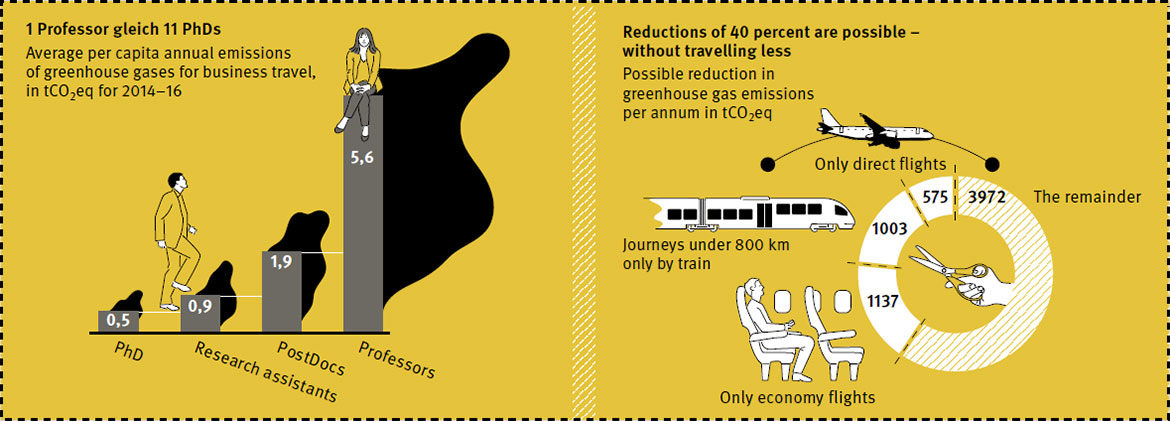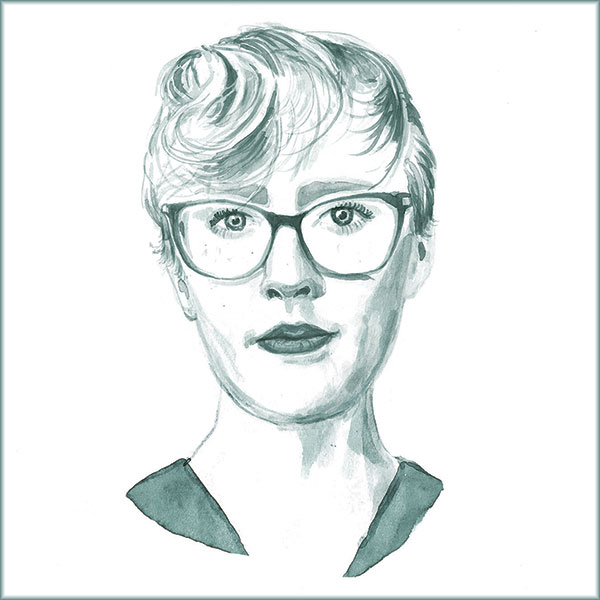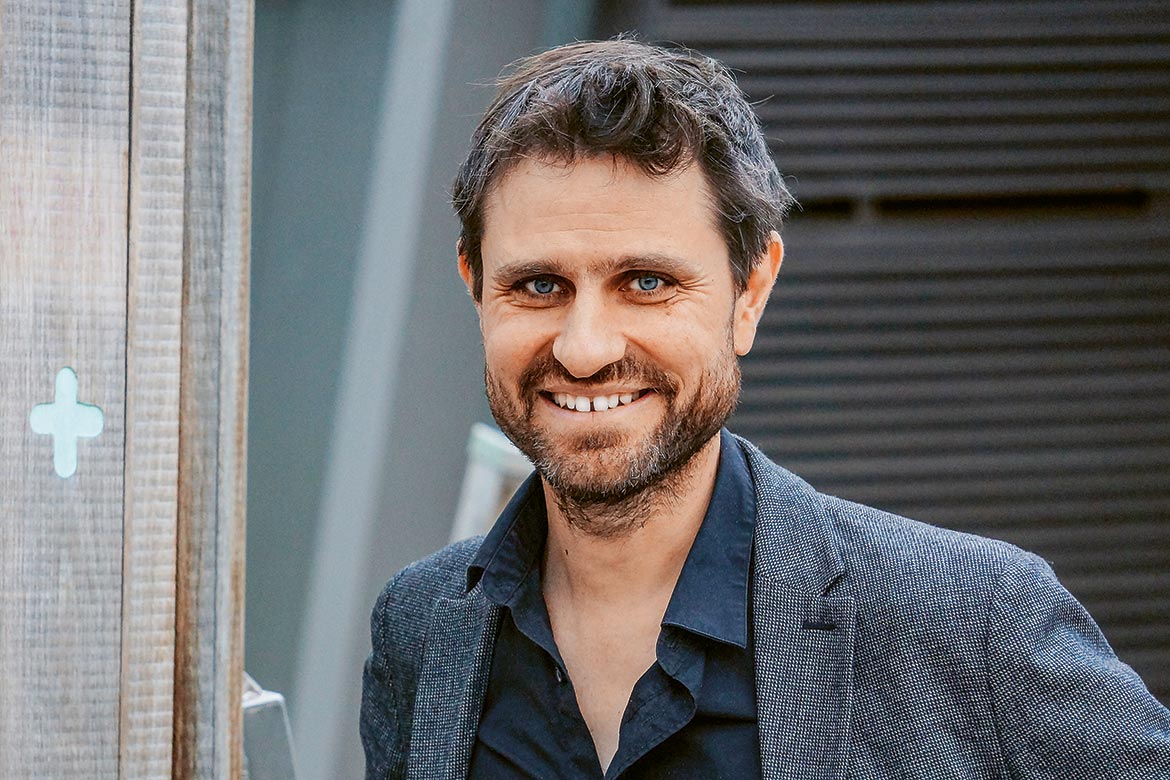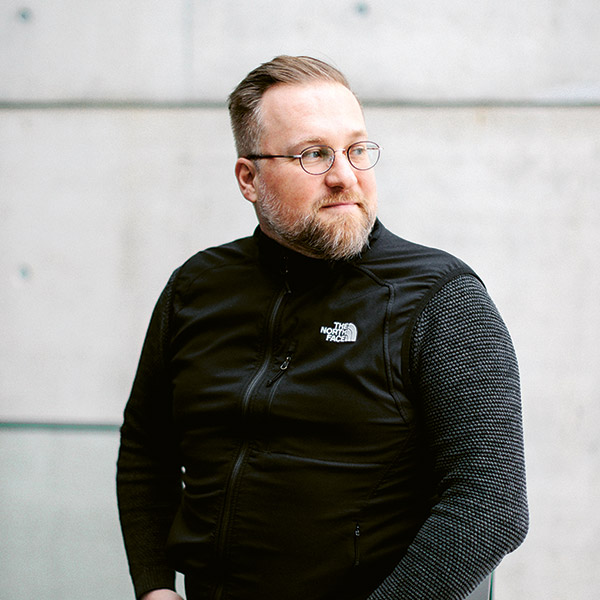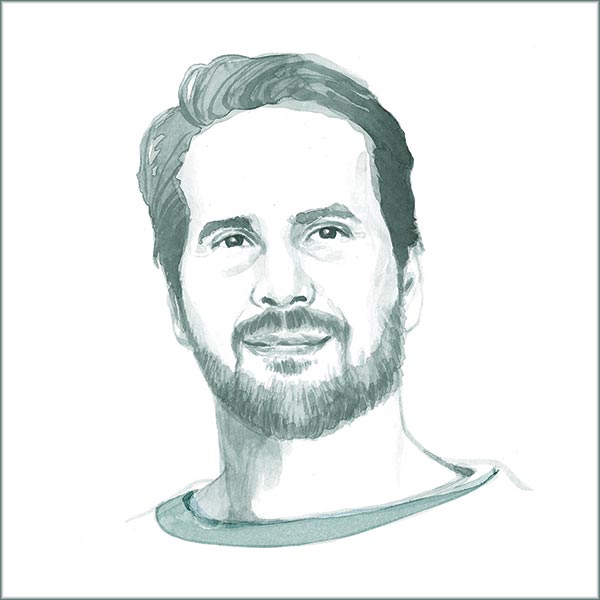Academia aims to reduce its own CO2 emissions
Researchers fly all over the world to take part in conferences and exchange ideas face-to-face. And they often do so without thinking about the impact on our climate. But if the oncologist Daniel Helbling has his way, that will soon change. We look at three initiatives from scientists who are keen to improve the sustainability of their own disciplines.
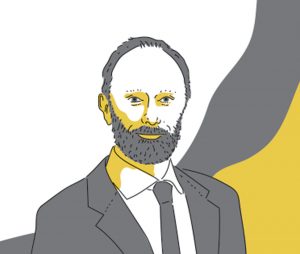
Marco Mazzotti | Illustration: 1kilo
“If we are really going to change things, then we first have to change our culture”, says Marco Mazzotti from the Department of Mechanical and Process Engineering at ETH Zurich. Back in 2017, ETH instructed all its departments to set goals for reducing greenhouse gases, and to state how these were to be achieved. Right from the start, Mazzotti got his students and postdocs involved. And the measures decided upon also put his students centre-stage. Financed by a CO2 levy on flights, students will be able to carry out concrete projects from 2019 onwards with the aim of pursuing these sustainability goals. “In this manner, hundreds of students each year can think about these problems and gather experience in how science can be made more sustainable”, says Mazzotti.
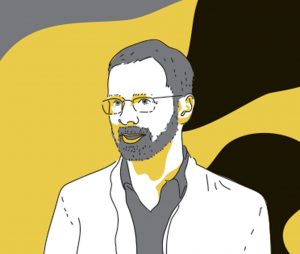
Daniel Helbling | Illustration: 1kilo
Every year, over 40,000 oncologists fly to the five-day conference of the American Society of Clinical Oncology. But some specialists from Switzerland prefer to travel instead to the quiet village of Flüeli-Ranft in the canton of Obwalden. They come together in an art nouveau hotel for three days at the same time that the conference takes place in the USA. A programme committee and numerous scouts check out the 4,000-5,000 papers scheduled for the US conference in advance, and choose those that seem the most relevant for Switzerland. “This saves a huge amount of time for our participants”, says Daniel Helbling from the OnkoZentrum in Zurich, one of the initiators of the Swiss meeting. The Swiss doctors gathered in Flüeli watch their chosen lectures by video, one day after they are given in the USA. They discuss them amongst themselves, but also engage with the speakers in the USA by means of a video link. “We save time, money and some 133 tonnes of CO2 every year”, says Helbling. “When I used to attend these conferences, I was exhausted afterwards, and simply knocked out by the huge number papers on offer. These days, I’m well-informed, but feel refreshed”.
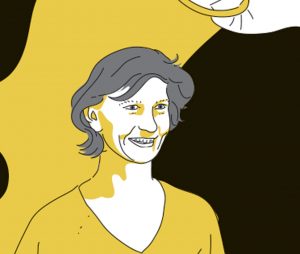
Gisou van der Goot | Illustration: 1kilo
Gisou van der Goot is Dean of the Faculty of Life Sciences at EPFL. Shocked by the amount of CO2 emissions from flights by members of her Faculty, she developed an ambitious plan to halve their emissions. “We are encouraging our assistant professors to attend just three international conferences a year”, she says. Exchanging ideas with fellow scientists remains important, of course, and to this end van der Goot intends setting up a first-class infrastructure for videoconferencing, and wants to organise regional and national hubs during international conferences. EPFL management is still working to develop the best combination of measures. “We fell like trendsetters”, says van der Goot.
The ecological footprint of research
Researchers fly a lot – even those whose field is climate change. But reducing their greenhouse emissions by some 40 percent wouldn’t even mean less travelling. All they have to do is take the train instead. And to fly economy class when they absolutely have to take the plane. Statistics released by ETH Zurich and EPFL offer convincing proof that this works.
Ideas for combatting greenhouse gases
ETH Zurich has been mobilising. All its departments and its administrative staff have had to state how they intend to reduce their greenhouse gas emissions. The result is a multitude of ideas, with one goal: a reduction in emissions of 11 percent per capita by 2025. These measures were implemented in January 2019. We offer a selection of the ideas here.
![]()
Reassessing ETH rules on climate suitability
![]()
![]()
![]()
![]()
![]()
![]()
![]()
![]()
![]()
![]()
Ideas for combatting greenhouse gases. | Illustration: 1kilo
“Ecologically responsible behaviour mustn’t become an impediment to anyone’s career”.
Reto Knutti, a climate researcher at ETH Zurich, is focusing his activity on a national level and never takes intercontinental flights just for one-day events. We here interview him about the difficulties of being environmentally conscious as a researcher.
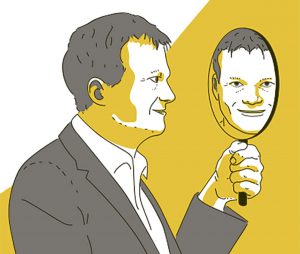
Reto Knutti is a researcher at ETH Zurich and is the chairman of ProClim, the Forum for Climate and Global Change of the Swiss Academy of Sciences. | Illustration: 1kilo
ETH Zurich wants to reduce its greenhouse gas emissions by 11 percent by the year 2025. Is that enough?
No, but it’s an important initial step. In Switzerland, we’re taking more and more flights. But we’re setting a different trend at ETH Zurich.
But the next 89 percent are going to be more difficult, aren’t they?
Not necessarily. We need to bring about a profound shift. Whoever wants to be regarded as a top-class researcher has to travel internationally. And when choosing conferences to attend, organising research partners or setting up field studies, distance no longer matters today. Changing this state of affairs will be the most difficult task. But we’re currently engaged in discussions about it.
Is global science possible without air travel?
It’s possible with far fewer flights than we take at present. And in individual cases, a researcher indeed has to be on the spot – such as when setting up new partnerships.
What do researchers and institutions risk if they rush ahead with these restrictive measures?
It’s difficult for younger researchers, because they first have to establish themselves on the scene. So we can’t just make demands; we have to change the evaluation criteria. Ecologically responsible behaviour mustn’t become an impediment to anyone’s career, or to achieving excellence in academia. For institutions, this turnaround also has advantages. The actual costs of taking lots of flights are greatly underestimated. I’m thinking here of the time invested, then jetlag, and the impact on one’s family.
Is it the duty of science to do something about it?
Sure. When you’re dealing with a global problem such as climate change, you can’t afford to allow any freeloaders. Everyone has to play a part, not just researchers. After all, the average Swiss citizen flies more miles per capita than any ETH scientist undertakes for his research.
And what’s your own stance regarding flights?
These days, I’m more active on a national level, and I’m finding projects here that are just as relevant as anything abroad. I fly as little as absolutely possible, never business class, and I never take an intercontinental flight for any event that lasts just a day.

